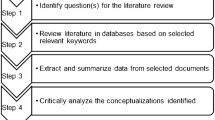Abstract
In surveying the medical literature on Islamic principles of research ethics, it is apparent that attempts to identify ethical principles are replete with issues of standards and gaps in knowledge of the uses of scriptural sources. Despite this, attempts at creating an Islamic ethical framework for research ethics may improve current practices in research in Muslim-majority countries and contribute to the growing canon of secular bioethics. This paper aims to identify principles and considerations within Islam that (1) overlap with current corpora on research ethics, and (2) further informs the current research ethics discourse.
Similar content being viewed by others
References
Abdel Haleem, M. A. S. (2004). The Qur’an: A new translation (Trans.). Oxford: Oxford University Press.
Aksoy, S. (2010). Some principles of Islamic ethics as found in Harrisian philosophy. Journal of Medical Ethics, 36, 226–229.
Aksoy, S., & Elmali, A. (2002). The core concepts of the ‘Four Principles’ of bioethics as found in Islamic tradition. Medicine and Law, 21, 211–224.
Aksoy, S., & Tenik, A. (2002). The ‘Four Principles of Bioethics’ as found in 13th century Muslim scholar Mawlana’s teachings. BMC Medical Ethics, 3, E4.
Alahmad, G., Al-Jumah, M., & Dierickx, K. (2012). Review of national research ethics regulations and guidelines in middle eastern Arab countries. BMC Medical Ethics, 13, 34.
Aqeel, A. I. (2007). Islamic ethical framework for research into and prevention of genetic diseases. Nature Genetics, 39, 1293–1298.
Aramesh, K. (2008). Justice as a principle of Islamic bioethics. American Journal of Bioethics, 8, 26–27.
Beauchamp, T. L., & Childress, J. F. (2009). Principles of biomedical ethics. New York: Oxford University Press.
Brown, J. A. C. (2009). Hadith: Muhammad’s legacy in the medieval and modern world. Oxford: One World.
Cahill, L. S. (2010). Religion and theology. In J. Sugarman & D. P. Sulmasy (Eds.), Methods in medical ethics (pp. 73–90). Washington: Georgetown University Press.
Denny, F. M. (2001). Community and society. In J. D. McAuliffe (Ed.), Encyclopaedia of the Qur'an (1st ed., pp. 367–386). Leiden: Brill Publishers.
Ernst, C. W. (2011). How to read the Qur’an: A new guide, with select translations. Chapel Hill: The University of North Carolina Press.
Fadel, H. (2010). Ethics of clinical research: An Islamic perspective. JIMA, 42, 59–69.
Gharebaghi, R., Mahdavi, M. R. V., Ghasemi, H., Dibaei, A., & Heidary, F. (2007). Animal rights in Islam. AATEX, 14, 61–63.
Hedayat, K. M., & Pirzadeh, R. (2001). Issues in Islamic biomedical ethics: a primer for the pediatrician. Pediatrics, 108, 965–971.
IOMS. Islamic Organization for Medical Sciences. (2004). International ethical guidelines for biomedical research involving human subjects–an Islamic perspective. Available at: http://islamset.net/ioms/code2004/index.html [Accessed April 14, 2015].
Lawerence, B. B. (2007). The Qur’an: A biography. London: Atlantic Books.
Marcum, J. A. (2012). The virtuous physician: The role of virtue in medicine. New York: Springer.
Mobasher, M., Aramesh, K., Aldavoud, S. J., Ashrafganjooei, N., Divsalar, K., Phillips, C. J. C., et al. (2008). Proposing a national ethical framework for animal research in Iran. Iranian Journal of Public Health, 37, 39–46.
Mobasher, M., Salari, P., & Larijani, B. (2012). Key ethical issues in pediatric research: Islamic perspective, Iranian experience. Iran Journal of Pediatrics, 22, 435–444.
Mustafa, Y. (2014). Islam and the four principles of medical ethics. Journal of Medical Ethics, 40, 479–483.
Naderi, M. M., Sarvari, A., Milanifar, A., Boroujeni, S. B., & Akhondi, M. M. (2012). Regulations and ethical considerations in animal experiments: international laws and Islamic perspectives. Avicenna Journal of Medical Biotechnology, 4, 114–120.
Nakyinsige, K., Che Man, Y. B., Aghwan, Z. A., Zulkifli, I., Goh, Y. M., Abu Bakar, F., et al. (2013). Stunning and animal welfare from Islamic and scientific perspectives. Meat Science, 95, 352–361.
Nasser, M., Tibi, A., & Savage-Smith, E. (2009). Ibn Sina’s Canon of Medicine: 11th century rules for assessing the effects of drugs. Journal of the Royal Society of Medicine, 102, 78–80.
Padela, A. I., Furber, S. W., Kholwadia, M. A., & Moosa, E. (2014). Dire necessity and transformation: entry-points for modern science in Islamic bioethical assessment of porcine products in vaccines. Bioethics, 28, 59–66.
Pratt, B., & Hyder, A. A. (2015). Global justice and health systems research in low- and middle-income countries. Journal of Law Medicine and Ethics, 43, 143–161.
Reinhart, A. K. (2001). Ethics and the Qur’an. In J. D. McAuliffe (Ed.), Encyclopaedia of the Qur’an (1st ed., pp. 55–78). Leiden: Brill Publishers.
Sachedina, A. (2005). Islamic ethics: Differentiations. In W. Schweiker (Ed.), The Blackwell companion to religious ethics (pp. 254–267). Malden: Blackwell Publication.
Sachedina, A. (2007). The search for Islamic bioethics principles. In R. E. Ashcroft, A. Dawson, H. Draper, & J. R. McMillian (Eds.), Principles of health care ethics (2nd ed., pp. 117–125). Chichester: Wiley.
Sachedina, A. (2008). Defining the pedagogical parameters of Islamic bioethics. In J. E. Brockopp & T. Eich (Eds.), Muslim medical ethics: From theory to practice (pp. 241–251). Columbia: University of South Carolina Press.
Sachedina, A. (2009a). Islamic biomedical ethics: Principles and application. New York: Oxford University Press.
Sachedina, A. (2009b). Islam and the challenge of human rights. New York: Oxford University Press.
Sartell, E., & Padela, A. I. (2015). Adab and its significance for an Islamic medical ethics. Journal of Medical Ethics, 41, 756–761.
Serour, G. I. (1994). Islam and the four principles. In R. Gillon (Ed.), Principles of health care ethics (pp. 75–91). London: Wiley.
Wendler, D. S. (2006). Assent in paediatric research: theoretical and practical considerations. Journal of Medical Ethics, 32, 229–234.
Westra, A. E., Willems, D. L., & Smit, B. J. (2009). Communicating with Muslim parents: “The Four Principles” are not as culturally neutral as suggested. European Journal of Pediatrics, 168, 1383–1387.
Author information
Authors and Affiliations
Corresponding author
Ethics declarations
Conflict of interest
None.
Ethical Approval
This article does not contain any studies with human participants or animals performed by any of the authors.
Rights and permissions
About this article
Cite this article
Rattani, A., Hyder, A.A. Developing an Islamic Research Ethics Framework. J Relig Health 58, 74–86 (2019). https://doi.org/10.1007/s10943-017-0508-8
Published:
Issue Date:
DOI: https://doi.org/10.1007/s10943-017-0508-8




